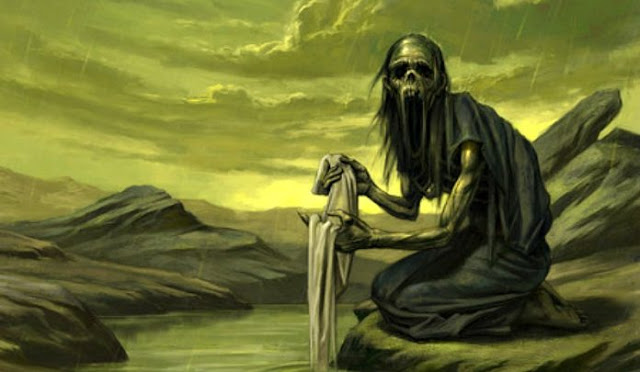Banshee - Irish Mythology
What is a Banshee?
It’s a dark night in Ireland, and the forests are filled
with mist. A bloodcurdling wail slices open the silence—and it is followed by
more cries. You might think that the anguished cries are coming from a dying
person, and in a way, you would be right. These are the cries of the ghostly
Banshee, meant as a warning that death approaches.
Physical Description
Despite their good intentions, Banshees don’t look like the
friendliest of creatures! They can appear as withered old hags or
supernaturally beautiful women. They wear shadowy grey cloaks or silvery
shrouds over red or green dresses. Their hair, which can be red or a pale color
that “shimmers like wildfire,” is long and windblown. And their eyes are always
inflamed from weeping.
The Scottish bean
nighe, which are often considered Scottish banshees, can be identified by a
few unusual signs: their breasts droop, they have only one nostril, and their
feet are webbed like a duck.
Personality
Banshees may seem ghoulish, but they have no record of being
violent or even mischievous. Their dark appearance probably comes from the
tragedy of their own lives; many people believe they are the spirits of women
who were murdered or died in childbirth. Others believe they are fairy queens
who were driven underground by the arrival of humans.
Given their own sad history, it’s not surprising that
Banshees are hypersensitive to sadness in other people’s lives, nor that their
expression of grief has taken on supernatural powers.
Banshees are also capable of deep devotion. Each Banshee
serves a specific family and will spend centuries trailing the children of that
family. They are also deeply devoted to their country, Ireland, and will attach
themselves only to families who are descended from Celts, not Normans or
Saxons.
Finally, there are clues that suggest that Banshees are
attracted to wealth and nobility. Some legends claim that they only serve the
ancient Celtic noble families: the O’Neills, the O’Briens, the O’Connors, the
O’Gradys, and the Kavanaghs. Others claim that, before the death of an
important leader, multiple Banshees will come together in mourning.
Special Abilities
Banshees are best known for their premonitions. They always
appear shortly before the death of someone in their designated family. In a few
stories, they have spoken out to tell exactly who would die and how. In most
cases, they simply wail—but the Banshee’s wail, in and of itself, is a powerful
message. It can be heard for miles and always chills the hearts of the people
who hear it. Some stories have described glass windows shattering when hit by
the high, plaintive notes of the Banshee’s song.
The bean nighe has
a slightly different way of sending her message. Rather than wailing, she
appears by a river, washing bloody clothes or armor in the water. She is also
more talkative than her Irish cousin, the Banshee, so she tends to give more
specific details about the death that is waiting just around the corner.
Cultural Origin
Before there were spectral Banshees wandering the hills of
Ireland, there were real women who did their job for them! These women, called
“keeners,” were hired to grieve either at a funeral or outside of a house where
someone was expected to die. Their wailing songs inspired other people to
grieve for the dead as well.
Historical records show that keeners were active around the
eighth century. Sometime after the eighth century, their popularity began to
fade, but their legend lived on in the form of Banshees.
By the fourteenth century, Banshee lore was in full swing.
They can be found in Irish, Scottish, and Norman literature during that
century. By the fifteenth century, belief in Banshees was so widespread that
even the King James I of Scotland reported encountering one of them!
Modern Appearances
Today, the Banshee is still a well-known figure. She is
liable to pop up around other ghosts, witches, and goblins for Halloween. She
has also appeared in some fantasy shows and movies, including Scooby Doo, Teen
Wolf and Banshee.
See you all tomorrow.
Buh-bye.





Comments
Post a Comment